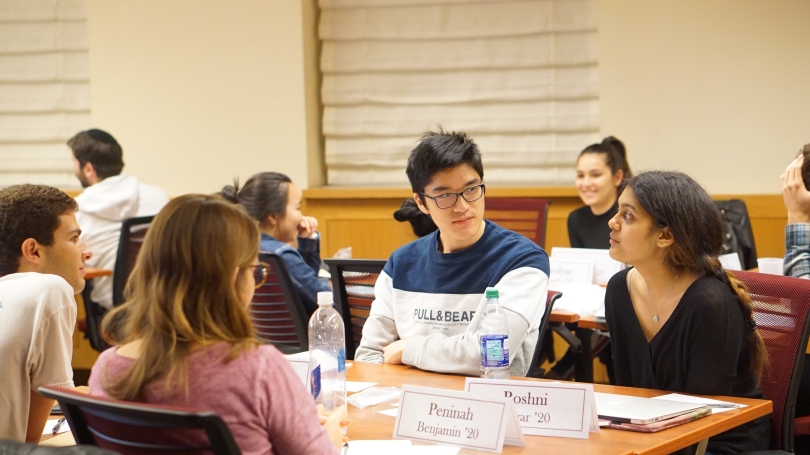
- Public Policy
- Leadership
- Funding
- News & Events
- About the Center
Back to Top Nav
Back to Top Nav
Back to Top Nav
Back to Top Nav
During the Fall Retreat, the Rockefeller Leadership Fellows enjoyed hearing from Jay Davis ’90 and learning about distinct styles for working in groups. Jay Davis’ 90 is an inspiring role model for many Dartmouth students – he directs the First Year Student Enrichment Program and the King Scholar Program, helping first-generation students and global student leaders transition and thrive both inside and outside of the classroom. Jay Davis has devoted his career to education; his previous work includes founding the Summer Enrichment at Dartmouth (SEAD) for low-income high school students from under-resourced schools, and teaching in the Secondary Teacher Education Program for the Dartmouth Department of Education.
Jay facilitated Compass Points, an exercise that helped us identify personal preferences in group work. We were self-selected to four different teams (North, South, West, and East), with each having a special team characteristic. For example, people choosing North like to take action and try things; people in South prefer to know everyone’s feelings before making decisions; people in East examine the big picture and consider other possibilities; and people in West pay attention to details. Each group is assigned questions in reflecting and identifying the strength and limitation to each personality type. It was interesting to see that the activity itself turned out the way as expected—the North group finished the quickest, and the South group discussed the most for questions, as they needed to hear everyone’s voice before coming to a conclusion. Jay followed up with questions on the biggest challenges we may face when working with people of opposite direction, and the ways we could mitigate the misunderstanding to minimize the differences.
The exercise, by grouping everyone by their preferences, allowed us to visualize how differences in personalities are played out under team setting. We saw how our inherent bias played a role in either facilitating or hampering groupwork: people identifying as North are decisive but should also incorporate the feelings of people in South; people in East are big-picture oriented but should also add in the details from people in West. In the end, our preferences are not being weighed against each other – rather, our distinct, individual styles are valuable and complementary, and we should take advantage of the diversity in leadership and teamwork styles.
-Written by Yifan He, Class of 2020 Rockefeller Leadership Fellow
As Rockefeller Leadership Fellows, seniors gain a better understanding of the qualities and responsibilities expected of leaders. As Fellows take part in the workshops, dinner discussions, and team-building exercises, they examine their skills, qualities, and attributes as leaders and analyze how these influence teamwork and achieving goals.